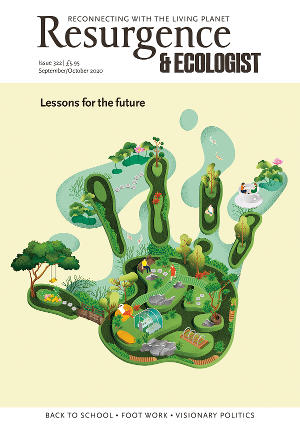As the poetry editor of Resurgence for many years, I have often wondered about the nature of eco-poetry. What makes it distinctive? As an immediate response, I often found myself going back to the etymology of the two words – for, so often, etymology offers a key to understanding. ‘Eco’, coming from the Greek oikos, denotes ‘home’ or ‘habitat’, and ‘poetry’ comes, ultimately, from the Greek poiein, meaning ‘to make’. So I came to a working definition: eco-poetry is the poetry that manifests through the art and craft of language our relationship to the living world that houses us: our common home. Eco-poetry, then, is characterised by theme, not by style or method, and its theme is ‘belonging’.
So far, so good.
But my definition, like nearly all definitions, remained somewhat abstract and schematic. Far too cerebral. It needed a fuller embodiment; it needed both example and amplification. But I could not easily point to a literary-philosophical work that revealed the scope and nature of the genre. At last I can. A book has just been published by the gifted poet John Burnside. Although the subtitle is ‘Poetry in the Twentieth Century’, this is somewhat misleading, for its concerns and range are so much larger. What the book offers is no less than a passionate defence of an eco-poetic understanding of literature and the world. What is emphatically and lyrically proposed is the idea that we all belong, however precariously, to one world, and that it is the mission of poetry to explore and enhance that relationship.
At the heart of the volume is a poetics of natural connectivity. Many poets from diverse cultures and epochs are drawn into its intricate global web, from Rainer Maria Rilke to Olga Orozco, from Emily Dickinson to Osip Mandelstam, but, in almost every case, we are invited to reflect on this fundamental question: how does the work throw light on our human predicament and our relationship to the all-encompassing ecosphere?
One piece of analysis will particularly appeal to Resurgence readers. In it, Burnside offers a commentary on A.R. Ammons’ free-verse poem ‘Corsons Inlet’. According to Burnside, it is one of the finest landscape poems ever written. Drawing on the writing of Rachel Carson, he shows how the poet evokes a natural world in a continuous state of flux and movement. Ammons’ poem is presented as a celebration of the act of walking through a landscape without a single desire to master or control. Zen walking! The lines of the poem enact the liquid movement of the poet’s mind as he blissfully walks through a wild landscape that is not his, but in which for a short time he is an eloquent guest, a creative witness. This poem, says Burnside, is an affirmation of “right dwelling”.
In one of the chapters, tellingly entitled ‘The Power of the Visible’, Burnside reveals how his intuition of the ultimate unity of things derived from his childhood sense of immediate connection. When given a bible at his Catholic primary school, he found himself impulsively scribbling his personal address inside the cover: “17, Blackburn Drive / Cowdenbeath / Fife / Scotland / Europe / The Solar System / The Milky Way”. This might have been Burnside’s first poem! And its theme is that of ultimate belonging. And meditating on his great theme, Burnside throws out a philosophical challenge. It is, he suggests, our task as human beings to convert the feeling of impersonal space into a feeling of place, then converting that experience of place into an experience of home, then finally transforming that awareness of home into dwelling. A series of creative mutations in which potentially alienated human beings begin to embrace and affirm the world into which they seem to have been arbitrarily thrown. The epic task of poetry is to bring about that transformation through the power and beauty of words.
This is the literary-philosophical manifesto we have long been waiting for.






